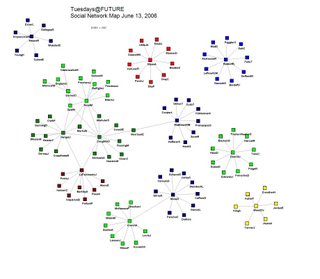LIVE BLOG: Building Brainpower in the Second Curve

This is the first social network map for the Tuesdays@FUTURE forums. This map shows the social networking activity resulting from the first two Tuesday@FUTURE forums.
Participants at today's forum include people who work in engineering, Phil Bessler Director of the Baldwin Wallace College Business Plan Center, the creative and arts industries, technology, innovation networks and arts placement.
We begin by cruzing through global examples of new and different ways learning can be approached today. Far surpassing documents, the creative learning environment includes kinetic and visual learning.
Here are links we discussed below:
"Digital Natives", by Marc Prensky, is a fantastic description of the cognitive changes affecting the way students learn today. Lev Gonick, Case's IT Director, summs up the U.S. capability to educate as not 10 years behind, but not even in the race.
Informal Learning and Community Libraries.
Ned Kahn creates kinetic sculptures. Learn more here.
Ned's brother, Ted, is an educator in the Bay area. Ted works on Collaboratories. Learn more at his site DesignWorlds for Learning.
The University of Michigan does extensive work on the concept of collaboratories - spaces of shared learning and resources connected by the Internet. Go here.
Arts Wisconsin has integrated the arts into everything they are doing. Check it out here.
Nine Sigma is creating new opportunities in technology - to address specific challenges in industry by outsourcing capabilities on a global scale. Nine Sigma has a program that will pay others for their connections.
See the article, "The Rise of Crowd Sourcing," in the June issue of WIRED. Large companies are now reaching out to the global space to identify the few companies that may specialilze in disruptive inventions to solve a specific challenge. The hardest challenge is to overccome the first level barrier of sharing and perception of value.
"The World is Flat", Tom Friedman version II is excellent reading. Between ubiquitous computing and inovations in service the competition barriers to international trade are gone. Take for example FedEx, who does all of the repair on Toshiba computers in 3 days to accelerate innovation and customer service. Read the WIRED review here.
The best IT skills are coming out of E Europe - Romania. If you are a lone inventor you can outsource all skills and services on an internet basis. This is a great time for being an inventor!


0 Comments:
Post a Comment
<< Home